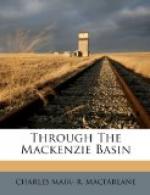On the 20th the eventful morning had come, and, for a wonder, the weather proved to be calm, clear and pleasant. The hour fixed upon for the beginning of negotiations was two p.m., up to which time much hand-shaking had, of course, to be undergone with the constant new arrivals of natives from the forest and lakes around. The Church of England and Roman Catholic clergy, the only missionary bodies in the country, met and dined with our party, after which all adjourned to the treaty ground, where the people had already assembled, and where all soon seated themselves on the grass in front of the treaty tent—a large marquee—the Indians being separated by a small space from the half-breeds, who ranged themselves behind them, all conducting themselves in the most sedate and orderly manner.
Mr. Laird and the other Commissioners were seated along the open front of the tent, and one could not but be impressed by the scene, set as it was in a most beautiful environment of distant mountains, waters, forests and meadows, all sweet and primeval, and almost untouched by civilized man. The whites of The region had also turned out to witness the scene, which, though lacking the wild aspect of the old assemblages on the plains in the early ’seventies, had yet a character of its own of great interest, and of the most hopeful promise.
The crowd of Indians ranged before the marquee had lost all semblance of wildness of the true type. Wild men they were, in a sense, living as they did in the forest and on their great waters. But it was plain that these people had achieved, without any treaty at all, a stage of civilization distinctly in advance of many of our treaty Indians to the south after twenty-five years of education. Instead of paint and feathers, the scalp-lock, the breech-clout, and the buffalo-robe, there presented itself a body of respectable-looking men, as well dressed and evidently quite as independent in their feelings as any like number of average pioneers in the East. Indeed, I had seen there, in my youth, many a time, crowds of white settlers inferior to these in sedateness and self-possession. One was prepared, in this wild region of forest, to behold some savage types of men; indeed, I craved to renew the vanished scenes of old. But, alas! one beheld, instead, men with well-washed, unpainted faces, and combed and common hair; men in suits of ordinary “store-clothes,” and some even with “boiled” if not laundered shirts. One felt disappointed, almost defrauded. It was not what was expected, what we believed we had a right to expect, after so much waggoning and tracking and drenching, and river turmoil and trouble. This woeful shortcoming from bygone days attended other aspects of the scene. Instead of fiery oratory and pipes of peace—the stone calumets of old—the vigorous arguments, the outbursts of passion, and close calls from threatened violence, here was a gathering of commonplace men smoking briar-roots,




